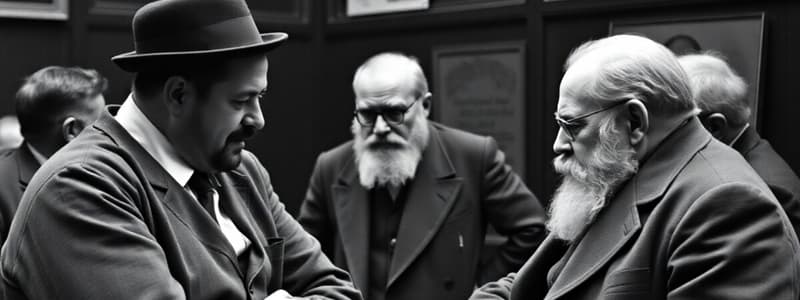Podcast
Questions and Answers
What is the primary focus regarding early classical philosophers in this content?
What is the primary focus regarding early classical philosophers in this content?
- Social institutions
- Enlightenment thinkers
- Durkheim (correct)
- Marx and Weber
Which aspect describes the view of society held by conservatives during the birth of sociology?
Which aspect describes the view of society held by conservatives during the birth of sociology?
- Society is an independent entity. (correct)
- Society is an individual construct.
- Society is defined by individual actions.
- Society is based on personal beliefs.
During the Enlightenment, which concept was central to its philosophy?
During the Enlightenment, which concept was central to its philosophy?
- Emotional reasoning over rational thought
- Rational, scientific, universal civilization (correct)
- Tradition as the basis for knowledge
- Resistance to change as a societal norm
What did conservatives believe about social institutions?
What did conservatives believe about social institutions?
What reaction did the conservative viewpoint promote against Enlightenment ideas?
What reaction did the conservative viewpoint promote against Enlightenment ideas?
What does Emile Durkheim describe as a state of normlessness resulting in feelings of confusion?
What does Emile Durkheim describe as a state of normlessness resulting in feelings of confusion?
According to functionalism, how is society best understood?
According to functionalism, how is society best understood?
Which concept addresses the cohesion of social groups, particularly in early societies?
Which concept addresses the cohesion of social groups, particularly in early societies?
What characterizes organic solidarity in society?
What characterizes organic solidarity in society?
What aspect of society does Durkheim emphasize in his study of the division of labor?
What aspect of society does Durkheim emphasize in his study of the division of labor?
Who is considered the founder of modern sociology?
Who is considered the founder of modern sociology?
Which of the following is NOT one of the four categories of suicide identified by Durkheim?
Which of the following is NOT one of the four categories of suicide identified by Durkheim?
Which point highlights the relationship between sociology and natural sciences?
Which point highlights the relationship between sociology and natural sciences?
What term describes general social features that exist independently of individual actions, as defined by Durkheim?
What term describes general social features that exist independently of individual actions, as defined by Durkheim?
What is one of the main characteristics of modern industrial society, according to Durkheim?
What is one of the main characteristics of modern industrial society, according to Durkheim?
Which of the following is a characteristic of organic solidarity according to Durkheim?
Which of the following is a characteristic of organic solidarity according to Durkheim?
What are the two types of integration identified by Durkheim?
What are the two types of integration identified by Durkheim?
What is one way in which individuals are made to feel part of a larger social collective, according to Durkheim?
What is one way in which individuals are made to feel part of a larger social collective, according to Durkheim?
Flashcards are hidden until you start studying
Study Notes
Classical Social Theories
- Early philosophers like Durkheim, Marx, and Weber shaped foundational sociological concepts, with Durkheim being the primary focus in this section.
- Theories aim to explain relationships between facts and events, enabling predictions; each theory possesses unique strengths and weaknesses.
The Enlightenment (1650-1799)
- Enlightenment thinkers promoted critical reasoning and practical knowledge, challenging traditional Christian teachings.
- This period encouraged questioning of authority and facilitated the masses’ ability to oppose their oppressors.
- Rational, scientific, and universal civilization were central themes, leading to societal transformation.
- The birth of sociology arose as a conservative response to the transformative ideas of the Enlightenment.
Economic and Political Upheaval
- Significant events during the period included the American Revolution (1775-1776) and French Revolution (1787-1799).
- The Industrial Revolution marked the rise of capitalism, accompanied by extensive urbanization and secularization.
Birth of Sociology
- Conservative views assert society exists as a separate entity that shapes individuals, rather than individuals creating society.
- Key points include:
- Society consists of interrelated and interdependent parts.
- Change is perceived as a threat; the smallest unit of analysis is the family.
- Emphasis on social institutions and traditional hierarchies.
Functionalism
- Perceives society as a dynamic system with interconnected parts, where social structures aid individual fulfillment.
- Advocates that societal needs must cater to the majority.
- Dominated sociological thought from the late 1920s to early 1960s.
- Principal theorists include Herbert Spencer, Emile Durkheim, Talcott Parsons, and Robert Merton.
Emile Durkheim (1858-1917)
- Recognized as the founder of modern sociology.
- Introduced key concepts such as social facts, anomie, social solidarity (mechanical and organic), collective conscience, and social integration.
- Emphasized three main themes in his work:
- Social facts shape individual actions.
- Social solidarity denotes group cohesion.
- Positivism advocates for a scientific approach to sociology.
Functionalist Theories
- Durkheim's main assertion: human actions stem from collective societal norms rather than individualistic impulses.
- "Anomie" represents normlessness due to absence of clear societal goals, contributing to confusion and elevated suicide rates.
- Mechanical solidarity characterizes traditional societies, while organic solidarity emerges in modern, interconnected societies, highlighting individual contributions to the collective good.
The Division of Labor (1893)
- Investigated the societal integration process and how individuals participate in a collective social structure.
- Proposed two types of solidarity:
- Mechanical solidarity focuses on uniformity and shared experiences among individuals in small, traditional communities.
- Organic solidarity arises from interdependence in larger, more complex societies that embrace individual differences.
The Rules of Sociological Method
- Establishes sociology as a unique discipline, distinct yet compatible with natural sciences.
- Highlights the importance of applying scientific methods to social studies and differentiating sociology from psychology.
Suicide (1897)
- Suicide types are linked to levels of social integration, defined by attachment to social groups and their goals.
- Identified two key characteristics in modern society causing suicides:
- Lack of individual integration within social groups.
- Insufficient moral regulation by societal norms.
- Categorized suicides as:
- Egoistic
- Altruistic
- Anomic
- Fatalistic
Critique and Applicability of Functionalism
- Functionalism faces criticisms concerning its inability to address social change and conflict.
- Questions arise about the current relevance of functionalist theory in modern sociology.
Studying That Suits You
Use AI to generate personalized quizzes and flashcards to suit your learning preferences.




